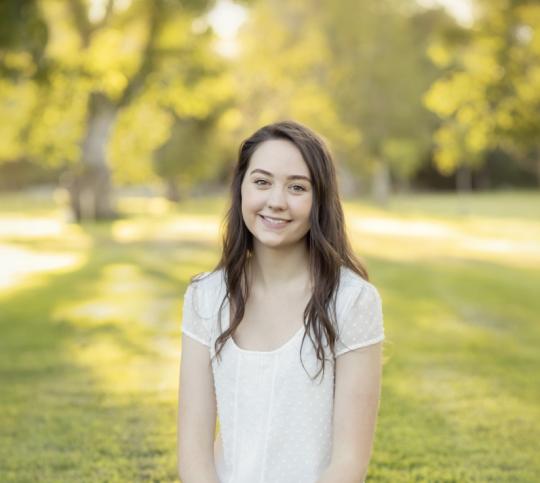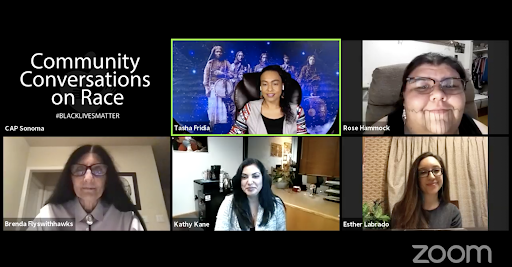Decolonizing The Way We Think
“We come from greatness. We come from a long line of strong Native and Indigenous people. I think it’s important that we remind ourselves of that,” said panelist Rose Hammock during the Community Conversations on Race.
This event, hosted by Community Action Partnership of Sonoma County, was moderated by Kathy Kane and featured four Native women panelists; Tasha Fridia, Rose Hammock, Brenda Flyswithhawks, and Esther Labrado. This conversion centered on topics including the missing and murdered Indigenous women epidemic, cultural appropriation, UnThanksgiving Day, and the education system.
When asked to discuss the issue of missing and murdered Indigenous women, Hammock said, “A lot of people, even our own Native community are not aware of this epidemic that's been going on a long time. Our women go missing ten times as much as any other community.” Further, there are only a few organizations that do public outreach and awareness around these cases. She also mentioned that when it comes to solving these cases, often the family of the missing individual are the ones searching and spreading awareness before law enforcement. Fridia then mentioned that “there are steps in the right direction...there is good work getting done” in terms of federal funding. “Hopefully there is a continuation of elevating this issue and keeping it on the radar. I don’t think this is something we can let go to the side,” said Fridia.
Kane asked the panelists whether or not they believe the murders are racially motivated to which Fridia responded, “Maybe the perpetrators aren’t selecting their victim because they are Native American. But we have other risk factors that put us at the potential to be victims more often...Whether that’s institutional racism, historical trauma, or socio economic issues...I would say in that respect it is racially motivated.” Flyswithhawks added that “as long as women, in general, are not valued the same as men, in general, are valued in the Western culture, I think women are going to be vulnerable to violence against them. And I think our Native people are more likely to be killed.”
The panelists then went on to discuss cultural appropriation. The importance of educating others was a big focus on this topic. In terms of buying Native art, Labrado mentioned that the main problem is when non-Native people don’t take the time to learn where that piece came from and the history behind it. “I think it's great to support Native artists. Find out who that artist is. Ask them about their design. The next step is not supporting designs that are framed as Indigenous or Native. If it's not a Native artist then don’t buy it,” said Labrado. Flyswithhawks stated that she thinks “it's important to make a distinction between cultural appropriation and cultural appreciation. Appropriation is when you are adopting a culture without that culture's permission and without acknowledgement of the culture's past. Cultural appreciation is when someone genuinely seeks to understand and learn about another culture in an effort to broaden their perspective and to connect with others cross-culturally. Not to be them, but to respect them.”
I feel that it is also important to mention that the cultures that are victim to appropriation are also cultures that are oppressed in America, so it can be extremely hurtful if a non-Native person, who makes no effort to support Indigenous peoples, appropriates their culture. Flyswithhawks made it clear that she would never shame someone who doesn't understand that they have appropriated something, but rather she would take that as an opportunity to educate that person and make a connection.
Kane then asked the panelists to discuss their views on Thanksgiving. Flyswithhawks brought up that in the 70’s, some Native communities started recognizing National Day of Remembrance instead of Thanksgiving. She mentioned that there is a lot of misunderstanding when it comes to Thanksgiving, and the idea of the “first meal” between the Natives and the pilgrims. There's much more history and truth behind what we are taught. “Why would we celebrate people who tried to destroy us... It was created, with all due respect, for white people to feel comfortable...Once you get the truth from Indigenous people, now it’s up to you to make a difference,” said Flyswithhawks. Hammock then talked about how Thanksgiving is a holiday that people use to be grateful, but for herself, and like many Native people, she practices thankfulness every single day. “There's so many little things that we forget to be grateful for,” said Hammock. She also added, “I just want to stress the importance of our own holidays and celebrations” such as Indigenous Peoples’ Day. That's a good chance to bring awareness.” Labrado emphasised again that they are only four voices and don't necessarily represent all Native people and cultures. “I don’t necessarily want people to walk away from this thinking no Native person celebrates Thanksgiving.” She said she thinks that is somewhat true, but growing up, she even celebrated a standard Thanksgiving which is also the case with some other Natives.
I believe whether or not you celebrate a standard Thanksgiving, the most important thing to remember is that growing up we were taught from a eurocentric point of view and we were often not told the full story, so we should take the time to understand that the history of how Native Americans were approached by colonizers was not a nice peaceful meeting, it was a time of brutal violence and oppression against Indigenous people. Fridia spoke to the idea that properly educating our youth is a chance to change the narrative. “We're on the trajectory to make positive change. I think we can start with our youth, and we will all be better for it,” said Fridia.
This led to the next topic of conversation, our education system. Kane brought up that traditionally the education system has been focused around Christianity and Christain holidays. In more recent times there has been somewhat of an effort to stray from this by renaming breaks, such as saying “Spring Break” rather than “Easter Break.” “We have to decolonize, not just our calendar, but our syllabus. We have to decolonize the curriculum in every institution...so that we give the correct history,” said Flyswithhawks. She mentioned that a great start to respecting the true history of Natives is by implementing a land acknowledgement in all schools. “I hope that we choose to remember Indigenous people every day,” said Flyswithhawks.
Kane closed the conversation with a final question from an audience member who asked what non-Native people can do to support the many issues that were discussed. Hammock said that one way is to support Native artists and Native organizations such as the California Indian Museum and Cultural Center and the Native Wellness Institute. When it comes to the issue of missing and murdered Indigenous women, Hammock encouraged viewers to give support to the Sovereign Bodies Institute and spread awareness through social media. Flyswithhawks wrapped up the event saying, “to the people watching, the best support that you are giving is an open heart and an open mind.”
I am extremely appreciative that this conversation took place and that I had the opportunity to learn about the ways in which we can begin to decolonize how we often think, as a result of being taught a sugar coated version of history. I believe we should take Flyswithhawks statement of “now it’s up to you to make a difference” as a call to action and truly engage ourselves in making a positive change. Specifically, as students and faculty of Sonoma State, we should take advantage of the opportunities that SSU provides such as our own Indigenous events and panels as well as classes offered by the Native American Multicultural Studies Department. We should also be sure to make land acknowledgments whenever possible. One thing I've learned from attending several events about civic engagement is that activism is essential, and the first step towards meaningful activism is self education. Events such as the Community Conversations on Race are great opportunities for self education. Once we’ve taken the step to educate ourselves on the issues that our communities are facing then we can bring awareness to those issues and use our voice, including through voting and pushing for reform such as incorporating diverse perspectives into curriculum.
To watch this event, or all past Conversations on Race, visit CAP Sonoma’s official Facebook page.

Author: Stephanie Farris



